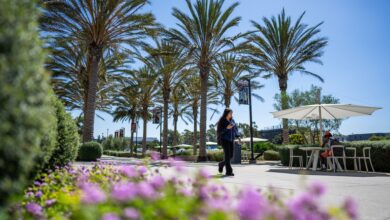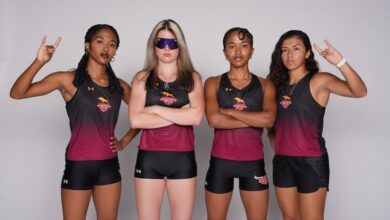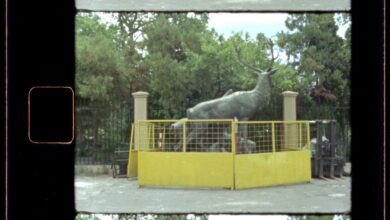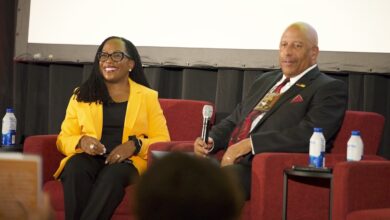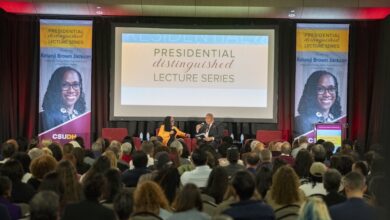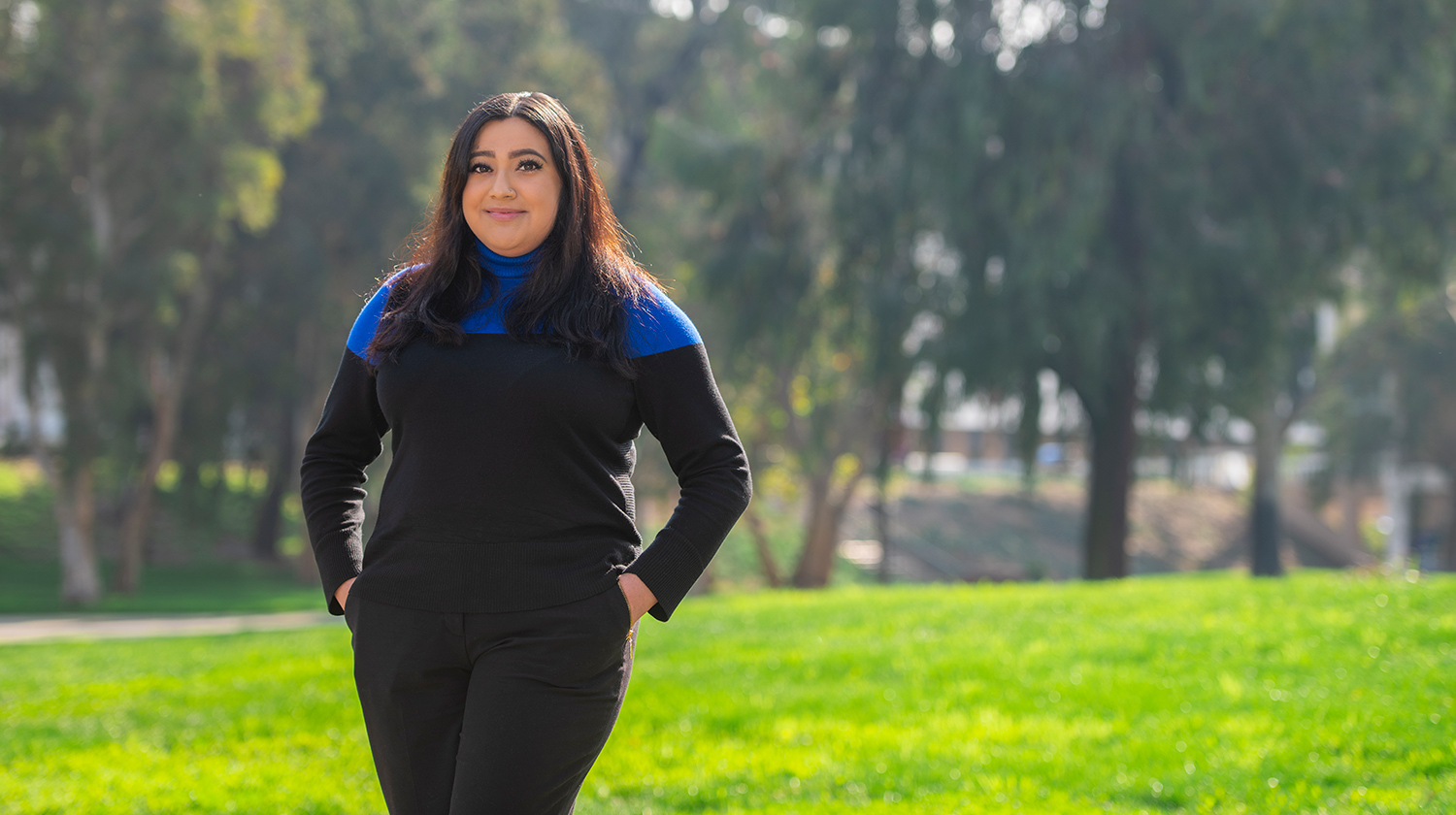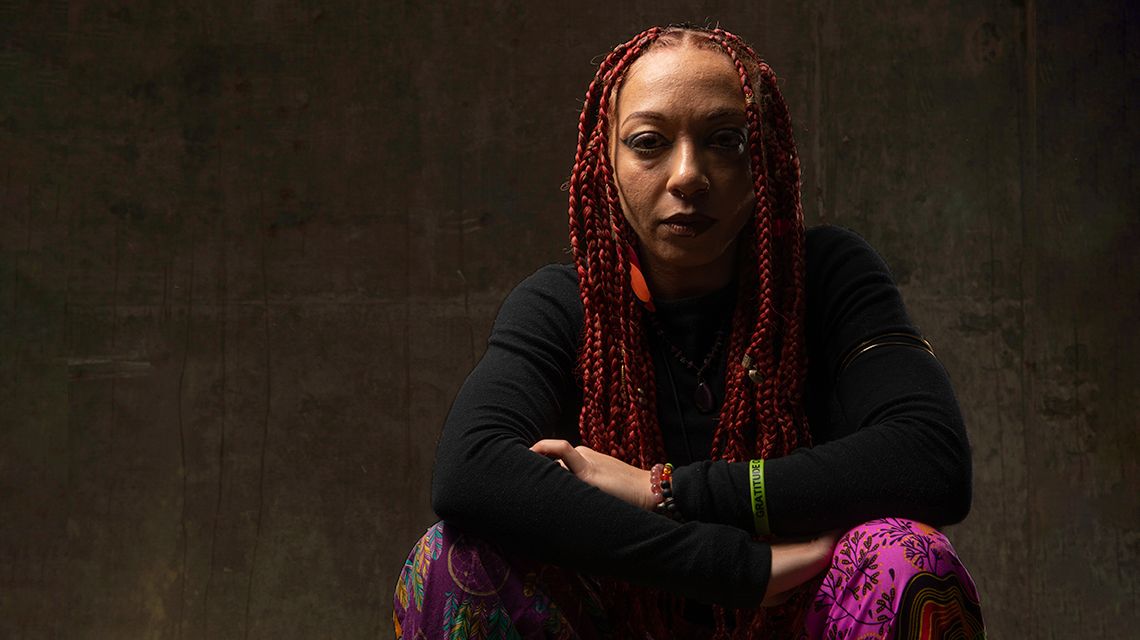
Everyone who attended the Black History Month opening celebration at CSUDH in early February was struck by the passion and energy of the woman who kicked off the proceedings. As she recited two poems and performed an original song, it was clear that Africana Studies Adjunct Professor Meryah Fisher had a palpable connection to the students in attendance, who enthusiastically cheered and danced along.
Such connections are by design. A large part of Fisher’s teaching is formulated to center her students as people before delving into the coursework. “We start out every single day with the question ‘How are you?’,” she says. “I didn’t even bother going over the syllabus during the first week this semester, because it was more important for us to do the relationship building.”
Fisher believes that too many professors get caught up in the amount of information they’re teaching, losing sight of those they’re teaching. “We start off by shoving work down people’s throats,” she says. “I say, let’s let people be people first. Let’s find out who everyone is. Let’s give them a second to meet each other. That has really helped to expand their participation in class, because they want to participate. It’s not forced on them.”
“I don’t count attendance,” she continues. “They paid for this. I tell them flat out, you can waste your money and not show up. That’s on you. I’m not going to tell you what to do and I’m not going to babysit you. But if you want to be here and you want to engage, great, let’s do that!”
Born and raised in a small New Jersey borough, Fisher says that she chose CSUDH because she was trying to explore life as far away from her hometown as possible. “I was definitely running away,” she says. “It was just that time in your teenage life when you’re asking what else is out there. Because my high school was in a failing district, it didn’t have expectations for us students. Nobody was talking to me about college.”
“I had a GPA over 4.0, and I had high SAT scores, and I could have gone anywhere,” she recalls. “But since it wasn’t a conversation we were having in school, I had no confidence in that. CSUDH was the only college I applied to, because I knew I could get in.”
Fisher’s transition to college life away from home led to more pain than the typical culture shock. She was a victim of sexual assault during her first semester, and wanted to leave school and return home. Her mother helped convince her to stick it out, and as Fisher says, “I’ve literally spent my entire life surviving. I buried myself in my work and graduated with two majors and a minor in four years.”
One of the reasons students connect with Fisher so strongly is her willingness to be open with them about her own struggles. “I’ve managed some pretty severe depression and anxiety since childhood, plus complex PTSD from domestic violence, and I’m very new to the self-love journey,” she says. “I’m only about two years in, actually.”
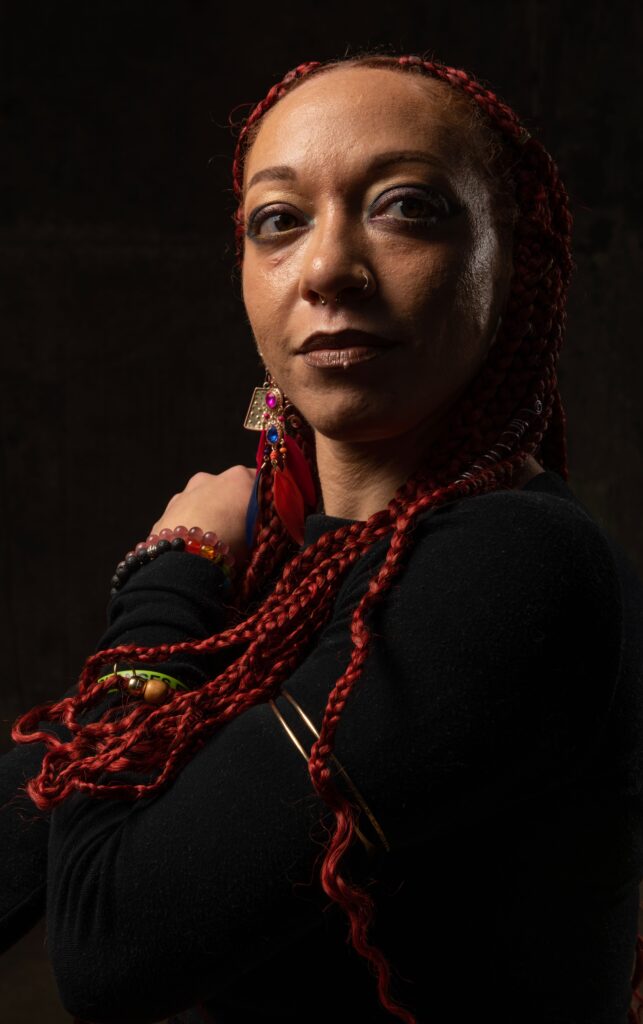
“I think when folks see me, their biases build more assumptions than truths… most folks would never imagine the life I’ve lived. I know this sounds dark, but it’s important. Others needs to know they can make it, too. So I’ve embedded activism around self-love and ending domestic violence into my platform as an intellectual artist.”
Fisher didn’t plan on getting into teaching after graduating from CSUDH. She was working at a nonprofit homeless services organization when she got a call from one of her former professors, Miguel Gutierrez of the Chicana/o Studies program, who thought she would be a good choice to lead an Africana Studies course for a local high school through the College of Extended Education (now the College of Continuing & Professional Education).
“I said, ‘Okay, cool,’ and got called in to start the next day,” she says. “I’ve been teaching here for seven and a half years since. This is where I found a love. I love what I do. I love the students, I love being an alum, I love all those things. Recently, I’ve come to understand that my position here is really about being the representation for students that I needed to see myself, but wasn’t there when I was in school. I’m here for them.”
The professor is always open and honest about her opinions, and has been known to ruffle a few feathers on campus, as she puts it. “When things are wrong, I’m going to call that out,” she says. “Because I love the students here and what we are building, I hate when things are wrong. I love the space and what it can do.”
One of Fisher’s most popular courses is Africana Studies 205: Introduction to Hip-Hop. “I have the impression that the class came to me because I’m the youngest,” she laughs. “I’m no expert on hip-hop. I think that’s a misconception about being a professor. We’re not always experts. We’re learning a lot of the content as we go. A lot of teaching is just knowing how to teach material, whether or not you are an expert in it.”
“I’ve definitely learned more over the years, but I still don’t consider myself an expert,” she adds. “I spend a lot of time learning with my students, offering them questions to consider that I don’t have the answers to. I want to see what their development is, what their thought process is. Many professors are not willing to admit that they’re not experts, and won’t admit that they need to learn things, too. You have to be willing to learn.”
When Fisher took over the Intro to Hip-Hop class, it was primarily dry theory, she recalls. Students didn’t listen to music or watch videos. In order to get accepted as an academic discipline, the study of hip-hop originally had to go overboard with scholarship and theoretical discussions. “When I took it over, it was already in the university,” she says. “So I started making some changes.”
While there’s still plenty of heavy reading, “We also do a lot of examination of pop culture,” Fisher says. “We look at the news and what’s happening in the world around us. We make it more of an immersive experience. Hip-hop is not just the music or the dances, it’s a movement. It’s a method of us as a community finding out what’s happening, sharing information, and resolving problems.”
“We have this this idea about who hip-hop is for and what it is that has permeated the culture, especially in mainstream hip-hop,” she adds. “It’s very repetitive. The drugs, the violence, the sex, the quick fame, the money. But hip-hop has humble beginnings, solid community beginnings. It was really a space that was challenging a lot of our social and economic and political understandings around race.
“That was dangerous at the time, and it’s still considered dangerous. There’s an understanding of race being really about the social expectations and experiences, as opposed to the anthropological, the genetic, or the biological. Developing that understanding in the community was dangerous, and was one of the reasons that hip-hop was co-opted in the way that it was, and why we hear what we hear on the radio today–just different voices saying the same words over and over again.”
As Black History Month 2023 comes to a conclusion, Fisher believes that hip-hop should be more universally acknowledged as Black history. “It started on the backs and breath of Black people. I don’t know how much more ‘Black history’ you can get than that. I’m just trying to keep it real.”
As her students can attest, Professor Fisher is definitely succeeding in that respect.
What do you enjoy doing when you’re not working?
Music, art, poetry, open mics… anything creative!
Favorite movie?
A very juxtaposed tie between Bamboozled (a Spike Lee Joint) and Jurassic Park!
Favorite book?
Jurassic Park! by Michael Crichton
Favorite song:
Currently it’s “Love Again“ by Alex Isley
First concert/Last concert/Best concert:
First: The Moody Blues; Last: Alex Isley; Best: either Ozzfest or Afropunk
What’s your favorite place to spend time?
In the community… local small cafés and gatherings
What’s a place you’ve never been to that you’d like to travel to?
Paris
Cats or dogs?
Both!! All the animals!!!
What inspires you to get up in the morning?
Every day is a fresh slate for creating my best life… I get up every morning at the excitement of what life can look like with me finally being its author.
What’s one thing you couldn’t live without?
Coffee – my mom still sends me Wawa coffee from home!
Describe yourself in three words:
“Authentic. Intellectual. Creative.”


